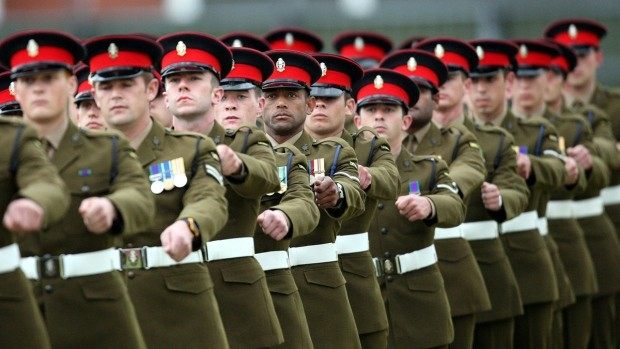Britain must commit to spending at least 2 percent of it’s GDP on defence budget as stipulated in Nato agreements or risk looking weak on the international stage, a number of politicians and army chiefs have warned. They have called on party leaders to include robust commitments to defence spending in their upcoming manifestos.
Last month Prime Minister David Cameron indicated that the defence budget may have to be further raided in order to deliver on deficit reduction targets. Speaking to the BBC’s Andrew Marr he refused to pledge to protect defence spending, saying: “Let’s see how these things develop, that’s going to depend on the decisions we make, on what happens with the economy.”
But Conservative politicians have criticised his lack of determination to protect defence spending at a time when the world is becoming a more dangerous place. Rory Stewart MP, chairman of the defence select committee has said “The world has never been so dangerous. There is a real need for [the 2 per cent commitment]. It is of really powerful symbolic importance. It is a very important deterrent to Russia in particular.”
And former Secretary of State for Defence Dr Liam Fox MP has today written for the Times’s Red Box, saying: “For years we have been lecturing our Nato partners that they have not made sufficient financial contribution to the alliance – and with good reason. Only four Nato nations currently meet the 2 per cent of GDP spending on defence that is supposed to underpin the organisation’s capabilities. Too many of our allies seem to want the insurance policy without paying the premiums.
“For Britain to fall out of the 2 per cent club would not only be a source of great anxiety to the United States, which already carries a disproportionate burden in terms of Nato spending, but will hugely undermine Britain’s moral authority and our ability to persuade others to make the spending commitment.”
Experts warn that if the defence budget is not raised by at least 3 percent by 2016, it will fall below the symbolic 2 percent of GDP figure. 20,000 army jobs have been cut under the coalition. So far, the Conservatives have promised to increase the equipment portion of the defence budget only, and that by just 1 percent. Labour, meanwhile, has said that it will not make any announcement on defence spending until a major review of the armed forces has been conducted, after the next election.
Amidst their reticence, a former senior Whitehall official has accused the party leaders of keeping the topic of defence spending off the table in order to shore up their electoral chances. “They have sought to neutralise this as an issue in the election, to clamp down on debate over defence so they can put their own ambitions for power ahead of the security of the country,” he told the Times. “How weak is that?”
Army chiefs have also spoken out: Air Chief Marshal Sir Michael Graydon, a former head of the Royal Air Force has described as “deeply regrettable” a decision by Downing Street last week to gag General Sir Nicholas Houghton, chief of the defence staff, out of concern that he may be critical of current policy.
“He might have said that unless the UK commits itself to a minimum defence budget of 2 per cent of GDP for the future, our credibility in Europe after the Nato conference in Wales last year will be zero,” Sir Michael said.
Admiral Lord West of Spithead, a former head of the Royal Navy commented “The 2 per cent is making a statement aimed at people like Putin and others that we are serious about defence and hard power.”
Money is not the only concern: the hawks are warning that Russia’s recent activities at the eastern borders of Europe are Putin’s way of testing the Nato nations’ resolve. Dr Fox singled out Russia as posing a “real and rising threat to Britain’s security”, warning “This is not necessarily because Russia poses a direct threat to the UK, though its forces regularly test our ability to defend our airspace and territorial waters, and there are still large numbers of Russian nuclear missiles pointed at the UK.
“The threat manifests itself indirectly because of the threat to some of our Nato allies. Malign Russian activity in the Baltic, the Balkans and the south Caucasus should remind us that under Article 5 of the Nato treaty an attack on one member is an attack on all.”

COMMENTS
Please let us know if you're having issues with commenting.